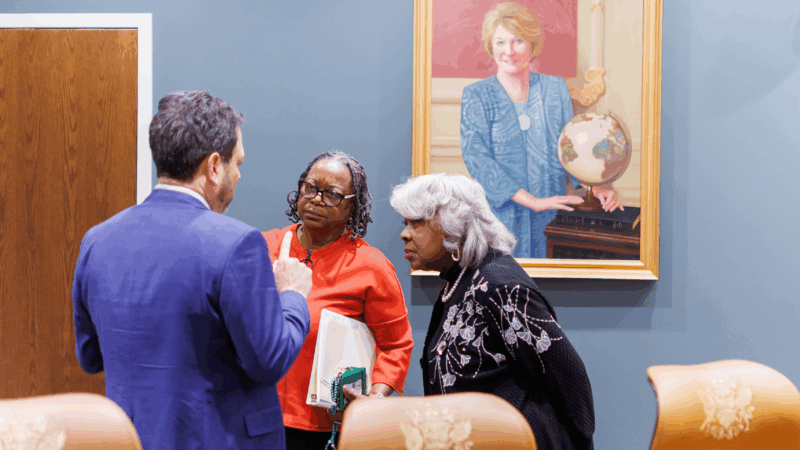The “Designated University Kid” on the Alabama Community that Raised him
Eric Motley grew up in a place where it would seem no one and everyone expected him to succeed. Madison Park, Alabama, is a small, African-American community on the outskirts of Montgomery founded by freed slaves. Motley was raised by his adoptive grandparents, and his memoir published last year is something of an ode to the town. He later went on to become a special assistant to President George W. Bush, and now he’s at the Aspen Institute, a Washington, DC-based think tank. Motley speaks Thursday evening at Samford University, his alma mater, and he spoke with WBHM’s Andrew Yeager about his book “Madison Park: A Place of Hope.”
Additional note: Samford University is a sponsor of WBHM programming. WBHM’s news and business departments operate separately.
Interview Highlights
On what is was like to be raised in Madison Park:
“Madison Park was a place where everyone knew their neighbor. It was a place where you were all tied in this single garment of destiny. What impacted you and your family impacted everyone else. For me it was an extension of family. It was an affirmation of self. It was an affirmation of who we were as a community, who we were as black people in America. It was an affirmation that life mattered and every life mattered.”
On being the “designated university kid” and surrounded by people pushing him to succeed:
“My grandparents who became my guardians after having adopted my mother felt that they had a special responsibility to be stewards of my promise and my future. And so they sought out people that they felt could encourage me and show me the way and help me to have opportunities that they were not afforded … I knew that the attention that I was getting was rather extraordinary. And I knew that their own desire for me to get a college education was rather exceptional as well. And so when you’re surrounded by people who are constantly affirming you, who are encouraging you to realize your potential, you develop this sense of purpose. And you develop this sense of responsibility and a sense of gratitude.”
On the pressure from the community to succeed:
“We frequently talk about peer pressure. If anything, this was positive pressure. I don’t think I recognized it was pressure. I recognized it as affirmation and trust. So if anything, I think it was inspiration; not pressure, but inspiration.”
Ilia Malinin, figure skater favored for gold, finishes 8th
Malinin, undefeated since 2023, stumbled and fell multiple times, landing far off the podium. Mikhail Shaidorov of Kazakhstan won gold in an upset that shocked even himself.
DHS says immigration agents appear to have lied about shooting in Minnesota
Julio Cesar Sosa-Celis was shot in the leg during the incident. Another Venezuelan man was also accused of attacking an immigration officer.
FBI releases description of suspect, increases reward in Nancy Guthrie case
The FBI describes the armed man caught on Nancy Guthrie's camera as 5-foot-9-inches to 5-foot-10 and of average build. The 84-year-old mother of Savannah Guthrie has been missing since Feb. 1.
Virginia court allows Democrats’ redistricting vote in their plan to counter to Trump
The ruling allows an April election where voters can let the legislature draw a new congressional map. It could help Democrats win more House seats. Republicans might still fight it in court.
A familiar move with a new twist: Trump tries to cut CDC funds he just signed into law
A federal judge in Illinois quickly issued a restraining order after the Trump administration slashed more than $600 million in CDC grants to four blue states.
Kitty cats and cloud hands – how U.S. Olympic snowboarders keep calm in competition
U.S. snowboarders psych themselves up before competition with heavy metal and pop music, cat photos, and apparently many on the men's halfpipe team now do Qigong.






